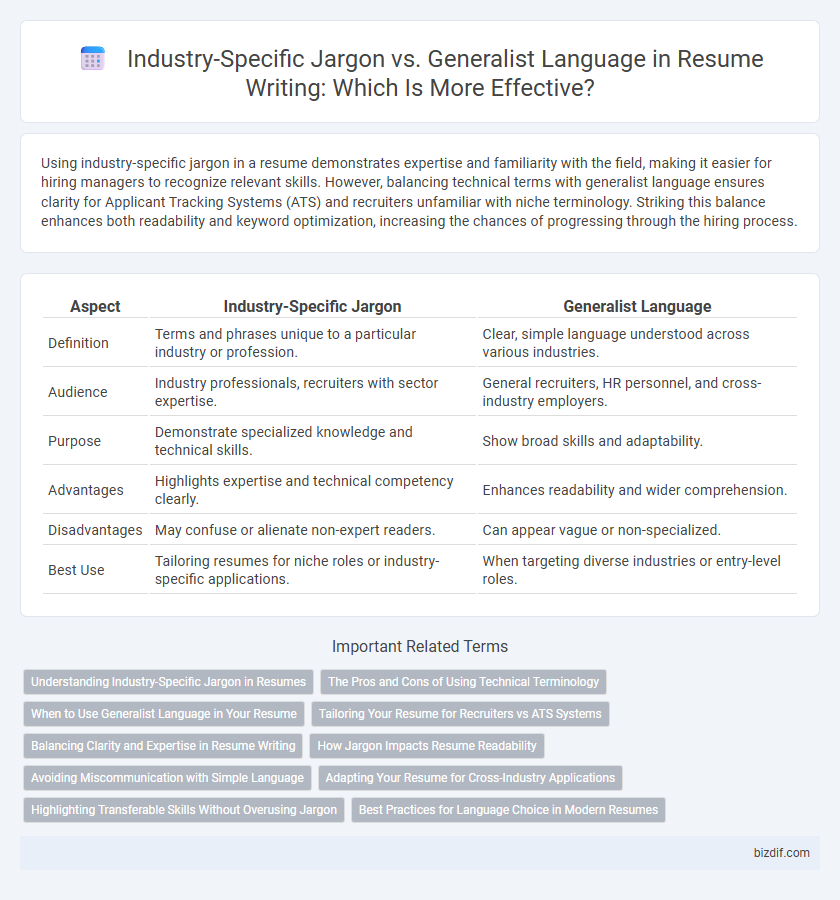Using industry-specific jargon in a resume demonstrates expertise and familiarity with the field, making it easier for hiring managers to recognize relevant skills. However, balancing technical terms with generalist language ensures clarity for Applicant Tracking Systems (ATS) and recruiters unfamiliar with niche terminology. Striking this balance enhances both readability and keyword optimization, increasing the chances of progressing through the hiring process.
Table of Comparison
| Aspect | Industry-Specific Jargon | Generalist Language |
|---|---|---|
| Definition | Terms and phrases unique to a particular industry or profession. | Clear, simple language understood across various industries. |
| Audience | Industry professionals, recruiters with sector expertise. | General recruiters, HR personnel, and cross-industry employers. |
| Purpose | Demonstrate specialized knowledge and technical skills. | Show broad skills and adaptability. |
| Advantages | Highlights expertise and technical competency clearly. | Enhances readability and wider comprehension. |
| Disadvantages | May confuse or alienate non-expert readers. | Can appear vague or non-specialized. |
| Best Use | Tailoring resumes for niche roles or industry-specific applications. | When targeting diverse industries or entry-level roles. |
Understanding Industry-Specific Jargon in Resumes
In resume writing, understanding industry-specific jargon enhances relevance by demonstrating familiarity with key terms and practices unique to the field. Incorporating targeted keywords like "Agile methodology" for IT or "GAAP compliance" for finance increases the chances of passing Applicant Tracking Systems (ATS). Balancing jargon with clear language ensures accessibility while showcasing expertise to potential employers.
The Pros and Cons of Using Technical Terminology
Using industry-specific jargon in a resume showcases expertise and aligns your skills with the targeted job, increasing relevance for applicant tracking systems (ATS) and recruiters familiar with the field. However, excessive technical terminology may alienate generalist HR professionals or automated screening tools unfamiliar with niche vocabulary, potentially reducing the resume's accessibility. Balancing precise keywords with clear, general language enhances comprehension and improves the chances of advancing through diverse hiring processes.
When to Use Generalist Language in Your Resume
Generalist language in your resume is essential when applying to diverse roles or companies outside your current industry, ensuring your skills and achievements are easily understood by recruiters from various backgrounds. Using clear, widely recognized terms increases the chances your resume passes through Applicant Tracking Systems (ATS) that may not be programmed for specialized jargon. Emphasizing transferable skills with generalist language highlights your adaptability and broad expertise, which is valuable in career transitions or entry-level applications.
Tailoring Your Resume for Recruiters vs ATS Systems
Using industry-specific jargon in your resume enhances relevance and appeal to recruiters familiar with the field, increasing the chances of catching their attention. For ATS systems, incorporating a balance of generalist language with targeted keywords ensures your resume passes automated screenings while remaining clear to human readers. Tailoring your resume with role-specific terminology and commonly used search terms optimizes its effectiveness across both human recruiters and applicant tracking systems.
Balancing Clarity and Expertise in Resume Writing
Using industry-specific jargon in resumes demonstrates expertise and aligns with employer expectations in specialized fields, while generalist language enhances clarity and accessibility for broader audiences. Striking a balance by incorporating relevant technical terms alongside clear, concise explanations ensures the resume resonates with both applicant tracking systems and hiring managers. Emphasizing key skills and achievements through precise vocabulary tailored to the target industry increases the chances of passing automated screenings and securing interviews.
How Jargon Impacts Resume Readability
Industry-specific jargon can enhance a resume by demonstrating expertise and familiarity with particular fields, but excessive use may hinder readability for recruiters unfamiliar with the terminology. Balancing technical language with clear, generalist terms ensures the resume remains accessible to applicant tracking systems (ATS) and human readers alike. Optimizing keyword usage to match job descriptions improves both readability and the chances of passing initial screening processes.
Avoiding Miscommunication with Simple Language
Using industry-specific jargon in resumes may confuse recruiters unfamiliar with specialized terms, reducing clarity and impact. Employing generalist language ensures broader comprehension and prevents miscommunication across diverse hiring teams. Clear, straightforward wording enhances the effectiveness of resume content, facilitating better candidate evaluation.
Adapting Your Resume for Cross-Industry Applications
Adapting your resume for cross-industry applications requires balancing industry-specific jargon with generalist language to ensure clarity and relevance to diverse employers. Highlight transferable skills using universally recognized terms while selectively incorporating key industry phrases that demonstrate expertise without alienating recruiters from other sectors. Emphasizing accomplishments with quantifiable results increases the resume's appeal across varying industries.
Highlighting Transferable Skills Without Overusing Jargon
Balancing industry-specific jargon with generalist language ensures resumes appeal to both niche recruiters and automated applicant tracking systems. Emphasizing transferable skills like communication, problem-solving, and project management enhances resume versatility across sectors. Avoiding excessive jargon prevents alienating non-expert readers while showcasing adaptability and core competencies effectively.
Best Practices for Language Choice in Modern Resumes
Use industry-specific jargon strategically to demonstrate expertise and relevance, but balance it with generalist language to maintain clarity for broader audiences, including HR professionals. Tailor terminology to the job description and company culture, ensuring key skills and achievements are easily understood by applicant tracking systems and human readers. Avoid overloading resumes with niche terms that may confuse non-specialists or automated screening tools.
Industry-Specific Jargon vs Generalist Language Infographic

 bizdif.com
bizdif.com